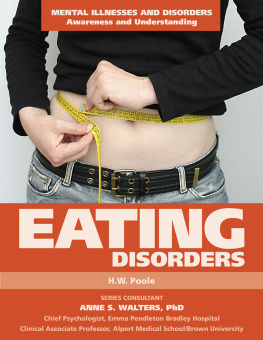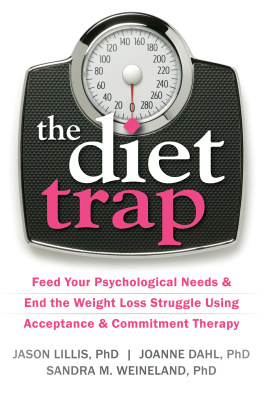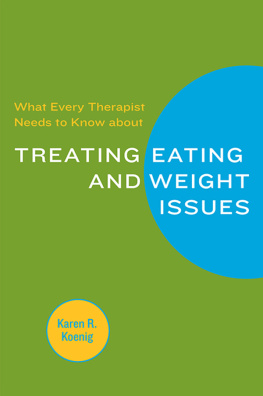
Acceptance- and mindfulness-based methods are having a big impact on the understanding and treatment of eating disorders and weight concerns. This groundbreaking volume is the very first to cover this cutting-edge work in a comprehensive way. Containing the most current thinking of some of the most active researchers and practitioners in this growing area, it will fundamentally change how you think about these critically important areas, and empower new approaches to old problems. Highly recommended.
Steven C. Hayes, PhD, Foundation Professor in the Behavior Analysis program at the University of Nevada, Reno, and codeveloper of acceptance and commitment therapy (ACT)
This new book, Mindfulness and Acceptance for Treating Eating Disorders and Weight Concerns, brings together contributions by the major groups working in these relatively new, yet exciting areas. The chapters are well chosen, clinically informed, and provide a comprehensive survey of the important advances in these fields. This work is highly recommended to clinicians, students, and scholars working in these areas.
James E. Mitchell, MD, Christoferson Professor of clinical neuroscience at Chester Fritz, Distinguished Professor of psychiatry and behavioral science at the University of North Dakota School of Medicine and Health Sciences, and research scientist at the Neuropsychiatric Research Institute
For so many people who struggle with obesity and eating disorders, traditional approaches to treatment have been ineffective, leading to frustration and a sense of futility for patients and clinicians alike. Mindfulness- and acceptance-based treatment approaches offer hope for nearly half of the people who fail to benefit from traditional treatment by integrating strategies and skills that directly address their challenges and barriers. This excellent book, edited and written by leaders in the fields of obesity and eating disorders, is the first to bring together cutting-edge, evidence-based approaches that incorporate mindfulness- and acceptance-based principles. Clinicians, educators, and researchers alike will find this volume extremely useful in advancing their knowledge and practice for addressing the vexing challenges of obesity and eating disorder treatment.
Nancy E. Sherwood, PhD, senior investigator and director of scientific development research at HealthPartners Institute for Education and Research
This excellent volume provides health professionals a front-row seat to examine third-wave cognitive behavioral therapies for eating disorders and obesity. Practitioners will appreciate the detailed clinical descriptions of acceptance and commitment therapy (ACT), mindfulness-based approaches, and related interventions. Researchers will find the volume balanced in its assessment of the benefits of these new approaches, as well as of what remains to be learned of their long-term efficacy and mechanisms of action. Make space on your book shelf for this welcomed contribution!
Thomas A. Wadden, PhD, Albert J. Stunkard Professor of psychology in psychiatry, and director of the Center for Weight and Eating Disorders at the Perelman School of Medicine, University of Pennsylvania
Researchers and clinicians alike struggle to make interventions for eating disorders and obesity more effective. This book is the first to bring together thought leaders from around the globe in order to consider innovative acceptance- and mindfulness-based approaches for the management of eating behavior and body image. I strongly recommend this unique resource.
Lucene Wisniewski, PhD, FAED, Chief Clinical Integrity Officer of The Emily Program
This innovative book brings together an international collection of clinical researchers who can knowledgably speak to the issue of introducing third-wave models to our understanding of eating disordered individuals. Carefully weaving constructs such as mindfulness, acceptance, awareness, and tolerance into their chapters, the authors astutely enhance conceptual understanding through their theories, and also introduce useful clinical techniques and strategies for clinicians. Focusing on both eating disorders and weight management, the book covers an extremely broad range of scientific and clinical topics that will be useful to clinical researchers and clinicians alike. This book goes a long way in terms of refining ideas that will ultimately enhance scientific studies of mindfulness and acceptance techniques for eating disordered individuals in the future!
Stephen Wonderlich, PhD, Chester Fritz Distinguished Professor and associate chairman in the department of psychiatry and behavioral science at University of North Dakota School of Medicine and Health Sciences, and chair of eating disorders at Sanford Health
Publishers Note
This publication is designed to provide accurate and authoritative information in regard to the subject matter covered. It is sold with the understanding that the publisher is not engaged in rendering psychological, financial, legal, or other professional services. If expert assistance or counseling is needed, the services of a competent professional should be sought.
Distributed in Canada by Raincoast Books
Copyright 2016 by Ann F. Haynos, Evan M. Forman, and Jason Lillis
Context Press
An imprint of New Harbinger Publications, Inc.
5674 Shattuck Avenue
Oakland, CA 94609
www.newharbinger.com
The Stanford model DBT for BED Diary Card in chapter 3 is reprinted from DIALECTICAL BEHAVIOR THERAPY FOR BINGE EATING AND BULIMIA, copyright 2009 Debra L. Safer, Christy F. Telch, and Eunice Y. Chen, by permission of The Guilford Press.
Cover design by Amy Shoup
Acquired by Catherine Meyers
Edited by James Lainsbury
Indexed by James Minkin
All Rights Reserved
Library of Congress Cataloging-in-Publication Data on file
Contents
Mindfulness and Acceptance for Treating Eating Disorders and Weight Concerns: Background and Rationale
Ann F. Haynos, PhD
University of Minnesota Medical Center, Minneapolis, MN
Meghan L. Butryn, PhD
Drexel University, Philadelphia, PA
Jason Lillis, PhD
Brown Alpert Medical School, Providence, RI
Evan M. Forman, PhD
Drexel University, Philadelphia, PA
T o introduce you to this book, we, the editors, invite you to participate in a brief exercise: review the influences related to eating and weight that you encountered in the past twenty-four hours. Within the past day, did you interact with anyone who was overweight or underweight, on a diet or overeating, or else deeply unhappy with some aspect of his or her body? Did you encounter either obvious or subtle influences encouraging you to overeat, such as food being easily available and enticing even when you were not hungry, a meal or snack being delivered in king-sized or jumbo-sized packaging, or pictures of fast food pervading your environment through magazine or television ads? How about messages encouraging you to change, or else dislike, your body, such as magazines telling you to lose weight for summer, the casting of an extremely thin actress in a television show, or someone making a negative comment about overweight people? Did you receive any messages encouraging you to push away or drown out difficult emotions or thoughts at any cost? If these experiences sound familiar and problematic, you are likely aware of how these nearly constant environmental pressures can foster behavioral patterns that result in eating disorders and/or obesity. We will spend the remainder of the introduction further highlighting what you, on some level, may already know: that problems related to disordered eating and weight concerns are immense and ubiquitous, and that increasing awareness and acceptance of the external and internal influences guiding problematic eating and weight patterns may play an important role in combatting these concerns.
Next page








